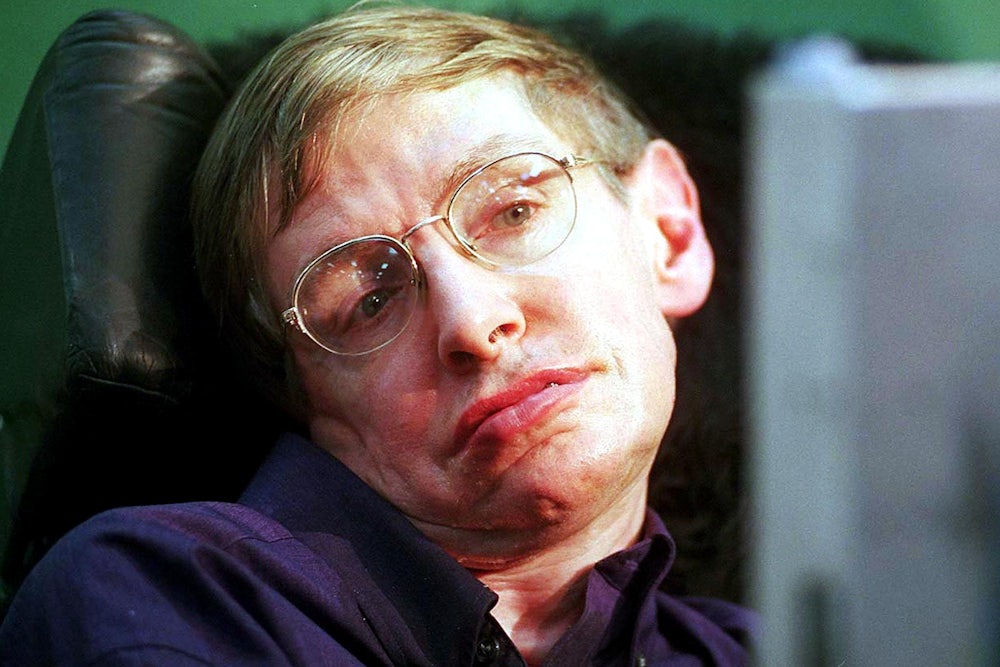Most people struggle to grasp Stephen Hawking’s groundbreaking work on black hole dynamics or gravitational singularity, or the mechanics of how galaxies arise in the universe. I do, anyway. But there’s one thing about the theoretical physicist, who died this week, that everyone understands: He was a genius.
That’s reflected in the many tributes to Hawking’s remarkable life, which ended on Wednesday after a long battle with Amyotrophic Lateral Sclerosis, also known as Lou Gehrig’s disease. Hawking was a “rare genius,” according to The Guardian; “a genius who could laugh at himself,” according to The Daily Beast. The Agence France-Presse described Hawking as “a genius who dedicated his life to unlocking the secrets of the Universe.” Amanda Gefter wrote in The Atlantic: “There’s just something about a guy who speaks in a computer voice that automatically makes him sound like a genius.”
Hawking deserves the title, if we’re judging by the Oxford Dictionary: A genius possesses “exceptional intellectual or creative power or other natural ability.” Hawking most certainly fits that definition, which, though quite broad, is overwhelmingly applied to male scientists. As a result, young women tend not to see themselves as geniuses—or being capable of becoming geniuses—and are therefore less motivated to pursue jobs in STEM fields. Many men deemed “geniuses” also tend to be excused for poor, even abusive, social and workplace behavior.
Hawking himself objected to the word “genius,” at least to describe himself. When asked by a college student in 1993 how it felt to be labeled “the smartest person in the world,” Hawking reportedly began typing rapidly. “It is very embarrassing,” he reportedly said. “It is rubbish, just media hype. They just want a hero, and I fill the role model of a disabled genius. At least, I am disabled, but I am no genius.” Hawking was also a self-described feminist, telling British journalist Piers Morgan last year that he was concerned about equal representation in the private sector. “Women are at least the equals of men, or better,” he said.
Hawking would likely appreciate the scientific literature showing how terms like “genius,” coupled with the rise of celebrity scientists (who happen to be mostly male), have harmed women in science.
Stockholm University gender studies professor Hillevi Ganetz examined the rise of Nobel laureates—science’s original celebrity geniuses—for a 2015 article published in the journal Celebrity Studies. The overwhelming majority of laureates are men, she noted; and when women are honored, interviewers ask questions about their clothes, their families, their domestic habits, while the male honorees are asked about hobbies and research. Thus, male laureates are presented as serious scientists with innate brilliance, female laureates as anomalies who succeeded through hard work. “The female genius must be hidden in favor of presenting a respectable femininity and a focus on the domestic sphere,” Ganetz wrote.
This unequal treatment has affected how women and young girls view themselves. A 2016 study in the journal Social Psychological and Personality Science found it difficult for many people to associate “woman” with “genius.” “We commonly think of genius as male,” study author and Cornell University researcher Kristen Elmore told Fortune. Another study published in the journal Science in 2015 found that women graduate students were more likely to avoid academic disciplines associated with raw, inherent intelligence—fields like philosophy, physics, and math. Sarah-Jane Leslie, the Princeton University philosophy professor who conducted the study, partially blamed pop culture, where “genius men are often portrayed as being innately smart, never having had to work hard to gain their insights,” NBC News reported.
A 2017 study published in the journal Nature showed that girls as young as six were more likely to characterize boys with brilliance than themselves. “This study shows that girls are internalizing those cultural messages early in development, believing that, yes they may work hard, but they are not naturally really smart,” Kentucky University psychology professor Christia Brown told The Guardian. “These beliefs can have important implications for what types of academic paths children choose to take, and shows why girls are opting out of majors like physics, despite earning high grades in school.”
Meanwhile, men deemed “geniuses” by their peers are often excused for abusive behavior toward women. This has been well-explored in the arts; men like Harvey Weinstein and Louis C.K. shaped their respective fields despite years of sexual misconduct. But the phenomenon is revealing itself in science, too, as celebrity “genius” scientists like theoretical physicist Lawrence Krauss and astronomer Geoffrey Marcy face allegations of serial sexual harassment.
Hawking represented the word “genius” well. To those who believe in the idea of genius—and many people don’t—he was objectively one. But he was also a man who, despite his celebrity and power, was widely considered to have treated people with respect. But too many “geniuses” are neither geniuses nor gentlemen. One solution would be to rescue the word, by applying it more selectively to men and more generously to women. Another, simpler solution would be to retire it altogether.
